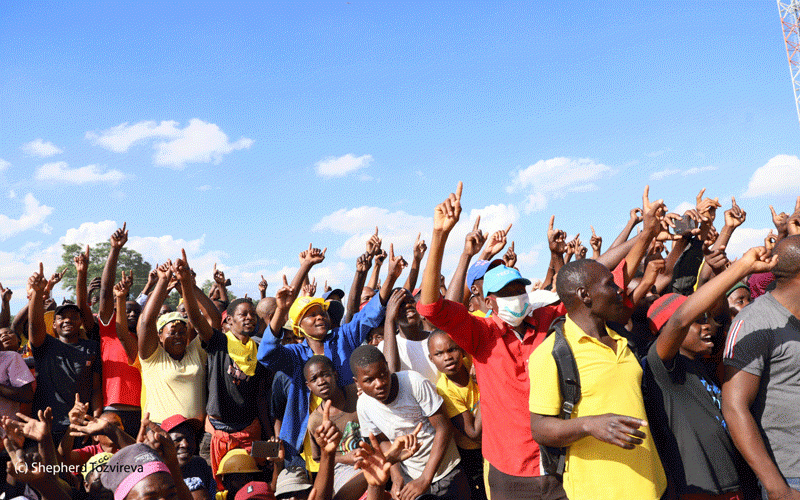
ZIMBABWE is one of the African countries experiencing a youth bulge — a demographic pattern in which the youths constitute a disproportionately higher percentage of the country’s population. However, despite this numerical superiority, the youth are often disengaged from the political processes that shape or influence their lives, such as voting. Young people represent a vital constituency for electoral mobilisation. Capturing this constituency is crucial for political parties interested in expanding their voter bases. Studying youth civic engagement might also bring valuable insights for policymakers interested in understanding the political participation patterns of the youth.
In this piece, I will discuss the implications of youth political participation. Youth political participation has several consequences for both individuals and society as a whole. I shall not seek to enumerate all the implications of youth political participation, but I will discuss those relevant to Zimbabwe and Africa.
Youth political engagement is crucial for the health and vibrancy of a democratic system. When the youth disengage from politics, it can weaken democratic processes by limiting the diversity of voices and perspectives. Higher political participation legitimises democracy, and conversely, low political participation undermines democracy. Therefore, the political involvement of the youth is essential for the present and future of democracy.
If the youths don’t register to vote, they forfeit the chance to participate in leadership positions obtained through elections. Due to the patriarchal nature of the Zimbabwean society, the older demographics are less likely to vote for younger candidates. It is commendable that the dominant political parties, Zanu PF and Citizens Coalition for Change, have made progress in emphasising the need for young candidates to vie for office in August 23 election. However, for these young aspiring leaders to be voted into positions of power, they need the support of their peers. That means the youth need to register and vote for their peers.
Assuming that younger and older age groups have different interests, the youth can overcome generational gaps by being politically engaged. Active political involvement of the youth helps to bridge the generational divide and promotes intergenerational dialogue. This involvement allows for exchange of ideas and knowledge between different age groups, fostering mutual understanding and co-operation, and building a cohesive society. Low youth political participation can exacerbate the gap between young and older people, creating a sense of disconnection and alienation. This divide can lead to social tensions and hinder national unity and stability if unmitigated. To its credit, the main political opposition in Zimbabwe MDC Alliance ran on the “generational consensus” platform in the 2018 election. However, this generational consensus can only materialise if the youths engage in political processes.
The youth can also be a potent force to cultivate and strengthen democracy. In the case of Zambia, then President Edgar Lungu had authoritarian tendencies, for example, jailing his political opponents. Still, he could not consolidate this authoritarianism because he was voted out of power by primarily young people who registered and turned out to vote in 2021. Therefore, African youths have a role in reversing democratic backsliding where it’s taking place or challenging dictatorships, just as they did in the 1990s.
In Zambia, the youth, mostly students, protested against the cost of living under President Kenneth Kaunda, which eventually led to the end of one-party rule, thus paving the way for democracy. In Malawi, the youths were at the forefront of the protests that prompted President Hastings Kamuzu Banda to hold multi-party elections. In South Africa, the young people played a vital role in the fight against apartheid. In Zimbabwe, the youths also played a crucial role in the struggle for independence. So we know that if the youth engage politically, they can be a formidable force for democratisation or change.
Political scientists such as Nic Cheeseman (2022) have observed that it is paradoxical that: “Africa is getting more authoritarian as it is getting younger.” The assumption is that younger people will likely possess liberal ideas that challenge authoritarian regimes. However, one way the authoritarian trends could be gaining traction is because the youths, despite their large numbers, are politically disengaged and are not holding elected officials to account.
- Mavhunga puts DeMbare into Chibuku quarterfinals
- Bulls to charge into Zimbabwe gold stocks
- Ndiraya concerned as goals dry up
- Letters: How solar power is transforming African farms
Keep Reading
Zimbabwean academic Chipo Dendere (2015) argued that the emigration of millions of young Zimbabweans and their subsequent exit from the political system led to the survival of the incumbent regime.
This pattern is even more problematic if the exit of young people leads to the survival of authoritarian regimes. When young people exit the political arena, their voices, participation, and representation are also lost. This is one of the reasons we need the diaspora vote. The diaspora vote will allow millions of the youths who have left the country to have a say in politics back in their country.
Encouraging youth political participation can have a long-term impact on society. Young people are more likely to develop lifelong civic engagement habits when actively involved in politics. They become more inclined to vote, participate in community organisations, join political parties, or run for office. This sustained engagement ensures a continuous cycle of informed and active citizens who contribute to the democratic process over time.
Addressing the issues of low youth political participation will require agency and concerted efforts from multiple stakeholders, including the government, civil society organisations, educational institutions and political parties.
Innocent Mpoki holds a Bachelor’s degree in political science from Middlebury College, and a Master’s degree in International Affairs from the City University of New York, Baruch College. Currently, he is a PhD student in political science and a teaching and research assistant at Boston College in the United States focusing on African politics.






